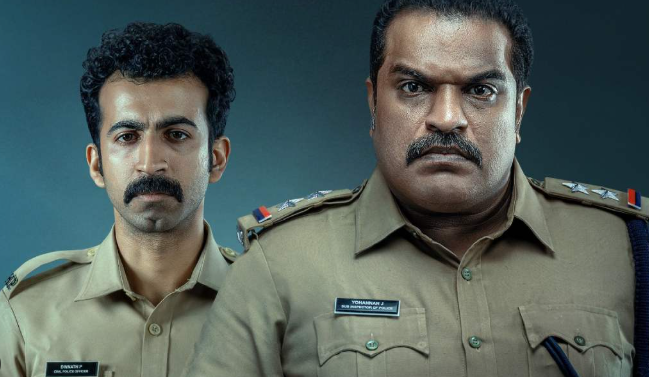By Latha Rajasekar
An intelligent plot-driven cop tale, that gradually transforms character-driven, engulfing the viewers through its gripping narrative and mindful acting. A novel premise, ironically feels very familiar, as it is tightly packed with acquainted sub plots from our everyday news-paper articles. But the screenplay effortlessly transcends the film to newer heights, as the lead men’s past trauma, changes the viewer’s notion about these two characters, only a while before the duo is left stranded helpless, towards the end of the movie.
A cop story by a screen writer who had worked in the police force, is bound have an edge, as the character traits are often drawn from real life character and the situations are fact-checked. We have been a witness to Shahi Kabir’s impeccable nuanced screen writing, right from his ‘Joseph’ days to the recent ‘Officer on duty’. His directorial debut, ‘Ella Veela Poonchira’ surprised the viewers, with an isolated cop story, that took an unnatural turn, leaving one numb. He was very convincing, as his skilful directorial skills, matched his prowess in writing and character building.

In ‘Ronth’ (meaning ‘patrol’), Shahi makes the viewers ‘shadow’ the night patrol officer and his driver. What begins as shadowing, turns an ‘overnight internship’ at the police station and a master class in story- telling. Shahi’s strength is that his story absorbed the audience into his world, making them become part of the lives of the lead actors. He is in fact a representative for his officer’s clan, as his work never misses to voice out for the police force in its entirety. His stories not only braves the world through his insider angles, but also silently pleads the mass, to take a closer look at the humans inside those uniforms.
The premise is established in brief beginning with the two police officers, one the assigned driver of the patrol jeep, played by Roshan Mathew and the other the patrolling officer on duty, played by Dileesh Pothen. Other than the lead characters, there are plenty one-liners looming around every other character that the lead duo is seen to be interacting with, making the backdrop move closer to reality and making the narration come alive on the big screen with added layers of story-telling.
For instance, the wife of Dileesh being inquisitive of the call records on his mobile, is layered with additional chapters of grief in a later reveal. In another instance a woman police officer on night duty pleads the night patrol officer not to bring any drunkards to the station, as they cause ruckus. The additional later layer is, when she requests Roshan to move aside while she attends a video call from her husband, as the husband is suspicious of her working on night duty around men folks.
The movie progresses as the duo attends to emergency calls during the length of their night patrolling and each encounter of theirs, is a short story in itself. The beauty of the narration is, with each emergency-call, that the duo tends to, renders a deeper glimpse of the human that they both individually are. Roshan’s eerie sequences of dealing with a call relating to a mentally unstable man harming his child, evokes his memories about his dad. Dileesh’s practical approach while handling a suicide case, mirrors his agony in his personal life, which unravels in the pen ultimate sequence.
The awkward unfriendly interactions between the duo, as Dileesh is constantly belittling Roshan, would normally indicate that the film would end with the two understanding each other for the honest person they truly are. But the director leaves the viewers twisted in grief, as the closing scene makes one dumbstruck, just like the way the director’s previous writings had. Indications were plenty in Ronth, but the director lures the viewers so cleverly and the movie ends ever so shockingly, NOT the way one would have wished it to have ended.
Operational stressors, are known to take a toll on the mental health of a police personnel. But the makers decide to highlight the consequences of traumas, relating to the organisational stressors as well. On one hand, the screenplay builds their stress levels up, block by block, through a beautiful documentation of the mundane events on a night patrol, and on the other, we are made to analyse that the duo’s stress actually stems from the ‘worry of perceptions’, by their own department men, their relatives and of course, the public.
Those ‘so-called’ mundane night patrol deed, gains significance, comes under scrutiny, as the sun rises, thanks to the usual ‘power abusing higher official’. The patrollers finally succumb to the chaos of vindictive accusations. And the movie ends, letting the audience sample the contrasts – how a seasoned officer would handle the allegation and how an emotionally fragile newbie would handle the same. The grim filled calmness in Dileesh’s face, to me spoke volumes on how an officer is torn apart from all possible sources and yet is expected to resurrect from it all, to be on duty, to save lives around, when he can’t save his own.
Our gaze on those poorly maintained, noisy, ‘Ronth’ vehicles, would remain changed, at least for many years until this story is forgotten. And that kind of a paradigm shift is what the team should have hoped to arrive at. And while achieving that, the team also leaves the viewers, speechlessly pondering how unfair life is for some. It only seemed natural to account how privileged each of our lives are.
The movie is an immersive experience as the viewers are completely drawn into the director’s narrative world that involves the lives of two policemen. And he accomplishes it all, in a single night’s narration. The intent of the Director’s script grips harder in retrospect, as it keeps lingering for long. I was left clinging to the duo’s lives, for days after walking out of the cinema hall, and wondered if it was only me.
